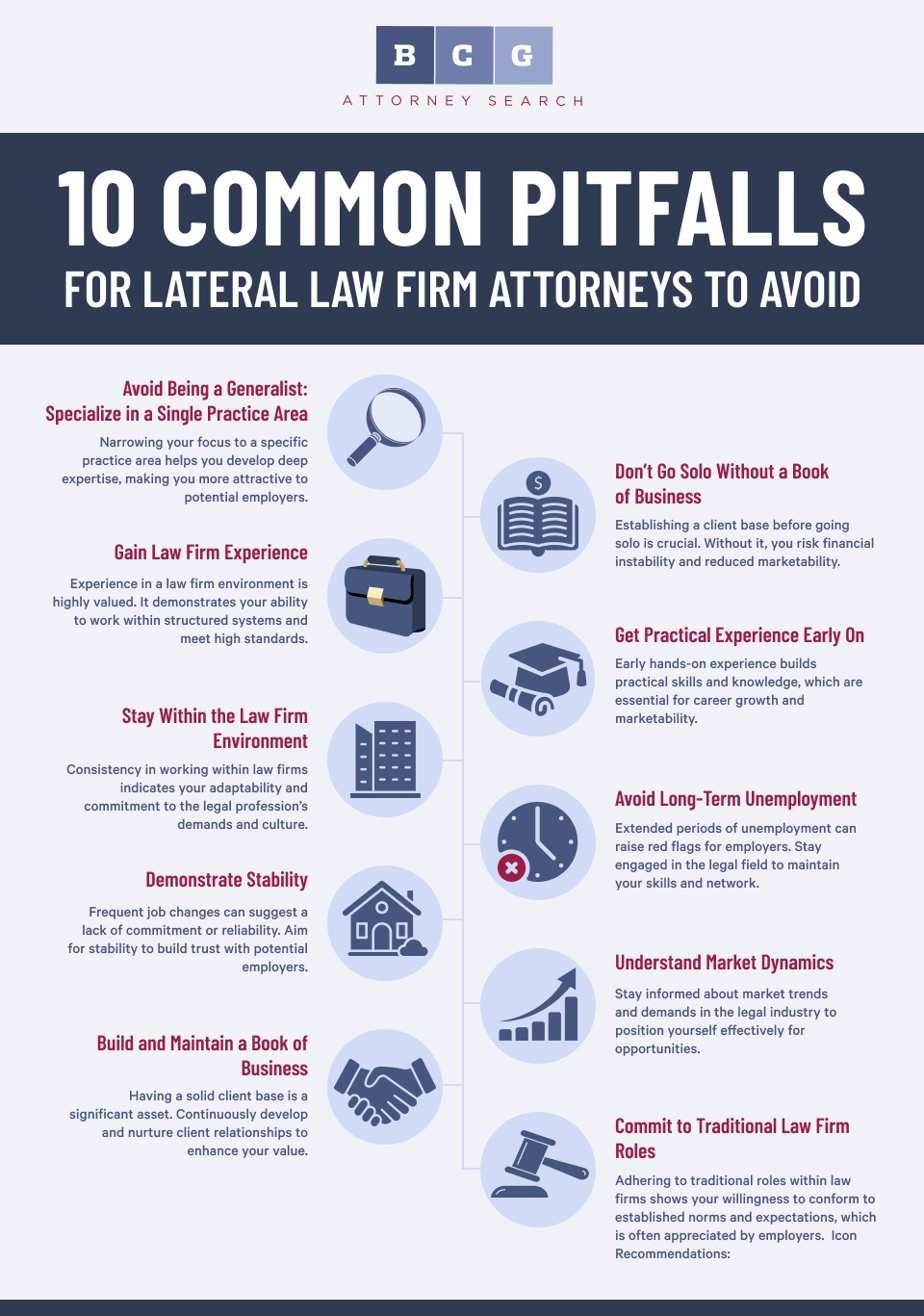
For an additional perspective on common pitfalls attorneys face, review the Top 10 career mistakes lateral attorneys make, which highlights other missteps that can stall career growth. Understanding the state of the lateral law firm market in 2024 helps attorneys see why avoiding pitfalls is more critical than ever. A well-planned lateral move can be transformative when approached strategically—see Law Firm Lateral Transfers: A Strategy for Growth and Success for insights.
1. Avoid Being a Generalist: Specialize in a Single Practice Area
Mistake: Presenting yourself as an expert in multiple, unrelated practice areas (e.g., entertainment law and trusts and estates).
Why It’s a Problem: Law firms value specialists over generalists. A specialist's deep knowledge in a single practice area is more beneficial than a broad but shallow understanding of multiple fields. Firms seek attorneys who can provide expert advice, handle complex issues within a specific area, and stay current with developments in that field.
Solution: Focus on specializing in one practice area. Choose a field that aligns with your interests and strengths, and then immerse yourself in it. This might involve taking on specific types of cases, attending relevant conferences, and continuously updating your knowledge. By becoming a specialist, you offer unique value and increase your marketability.
See Related Articles:
- How Much Do Practice Areas Vary from State to State? A Guide for Attorneys Looking for the Best Markets for their Practice Area
- 21 Reasons You Will Never Get a Job with a Major Law Firm Now (or Ever Again)
- How to Find Your Ideal Practice Area
2. Don’t Go Solo Without a Book of Business
Mistake: Becoming a solo practitioner without a substantial client base.
Why It’s a Problem: Solo practitioners who lack a robust book of business often face significant challenges when trying to transition back into a law firm. Firms may view solos as less stable and question their ability to work within a team-oriented environment. Moreover, solo practitioners might develop habits and workflows that are not aligned with firm standards, making integration difficult. Timing your career decisions is equally important — this guide on the best time for associates to move law firms explains how making the right move at the right time can secure long-term success.
Solution: If you choose to go solo, ensure you have a strong book of business. This means having a consistent client base that generates reliable revenue. Focus on building and maintaining client relationships, delivering exceptional service, and actively seeking referrals. Having a book of business not only demonstrates your ability to generate revenue but also your capability to manage client relationships effectively.
- Avoiding common pitfalls is easier when you are well-prepared; Mastering the Solo Practitioner Interview: Strategies for Success provides targeted strategies for solo practitioner interviews.
See Related Articles:
- Top 9 Ways For Any Attorney To Generate a Huge Book of Business
- How Should I Estimate My Portable Business?
- How Any Attorney Can Get a $100+ Million Book of Business, Become a Partner in a Major Law Firm, or Start a Successful Business and Retire Whenever They Want
3. Gain Law Firm Experience
Mistake: Having little or no law firm experience, or a significant gap in your law firm employment history.
Why It’s a Problem: Law firm experience is crucial for understanding the rigorous demands and expectations of firm life. This includes handling multiple clients, meeting tight deadlines, and working under high pressure. Candidates without law firm experience might struggle to adapt to these demands, resulting in lower productivity and higher turnover. If you are considering how to leverage your experience in transitioning firms, explore strategies for mastering the art of lateral moves.
- To understand how a strong platform mitigates risk, see building a successful career at Dechert LLP, which illustrates the kind of supportive environment attorneys should seek.
Solution: Seek opportunities to work in a law firm environment. Even if your initial positions are not ideal, they provide valuable experience that will be beneficial in the long run. Internships, clerkships, and associate positions are excellent ways to gain this experience. If you’ve been away from a firm for a while, consider taking a refresher role to reacquaint yourself with firm dynamics and expectations.
- Thoroughly researching target firms can help avoid mistakes — for instance, Carlton Fields PA: Unlocking Career Pathways in a Prestigious Law Firm highlights the importance of choosing firms that invest in associate development. Staying marketable also means gaining insights into standout firms like Adams and Reese LLP to understand where your skills are most valued.
4. Get Practical Experience Early On
Mistake: Graduating recently without gaining practical experience in a law firm.
Why It’s a Problem: While law school provides theoretical knowledge, practical experience is essential for developing the skills needed to succeed in a law firm. Firms typically seek candidates with 2-6 years of practical experience. Without this experience, recent graduates might struggle to meet the firm’s expectations and require extensive training and supervision.
Solution: Focus on gaining practical, hands-on experience as soon as possible. Internships, summer associate positions, and clerkships are excellent opportunities to gain this experience. Take advantage of every opportunity to work on real cases, interact with clients, and understand the day-to-day operations of a law firm. Early exposure to firm work can significantly enhance your employability.
Avoiding mistakes is just one side of the equation—discover the proactive steps to secure offers from prestigious firms in 6 Secrets How to Get Hired Laterally in A Prestigious Law Firm.”
5. Stay Within the Law Firm Environment
Mistake: Transitioning to roles outside of law firms (e.g., in-house, government, accounting firms).
Why It’s a Problem: Non-firm roles often involve different skill sets and work habits. These positions might not provide the same level of relevant experience needed for a law firm. Law firms require specific skills such as business generation, specialization, and billable hours, which are less emphasized in non-firm environments. When carefully planned, lateral transfers can be a growth strategy that benefit both attorneys and the firms they join.
Solution: If your goal is to be a marketable lateral attorney, maintain your career trajectory within law firms. This environment will help you develop the skills and experience valued by law firms. If you do transition to a non-firm role, ensure it’s a strategic move that aligns with your long-term career goals and provides valuable, transferable skills. Staying marketable also means understanding risk — The Legal Industry Layoff Report (2008–2026) offers a detailed look at historical layoffs across practice areas and firms.
- Maintaining long-term marketability is one of the key issues raised in The Challenges Senior Attorneys Face in the Law Firm Job Market
6. Avoid Long-Term Unemployment
Mistake: Experiencing long-term unemployment.
Why It’s a Problem: Long-term unemployment can raise red flags about your performance and adaptability. It suggests that you may have been fired or chose to leave a job without securing another position. This can indicate potential issues with your work performance, relationships with colleagues, or overall stability. For more context on how firms view employment gaps, see this article on overcoming common lateral hiring challenges.
Solution: Stay employed to the best of your ability. If you find yourself unemployed, take proactive steps to quickly secure a new position. Engage in activities that demonstrate your continued professional development, such as attending legal seminars, obtaining certifications, or volunteering for pro bono work. Showing that you are actively improving your skills and staying engaged in the legal community can mitigate concerns about your unemployment.
7. Demonstrate Stability
Mistake: Frequently changing jobs, indicating instability.
Why It’s a Problem: Frequent job changes can indicate a lack of commitment or poor performance. Law firms invest significant resources in training and developing their associates, and they want to ensure that these investments are worthwhile. Candidates who frequently move from one job to another are seen as risky, as they might not stay long enough to justify the investment. Stability is just one of the six factors prestigious firms care about when hiring laterals, making it critical to highlight in your career narrative.
Solution: Showcase your ability to commit to and grow within a firm. Stability is a key factor for law firms, as frequent job changes can suggest poor performance or an inability to settle. Aim to stay in roles long enough to demonstrate your value and achievements. If you do change jobs, ensure that each move is strategic and clearly contributes to your career growth.For practical advice on avoiding resume mistakes, see Avoid These 10 Common Pitfalls to Stay Marketable as a Lateral Law Firm Attorney.
- Choosing dynamic firms that emphasize growth, such as Kasowitz Benson Torres LLP: Unveiling the Pathways to Success in Law, can help attorneys avoid career stalls and remain competitive.

8. Understand Market Dynamics
Mistake: Overlooking the importance of market saturation and demand.
Why It’s a Problem: Supply and demand dynamics play a crucial role in legal recruitment. In highly saturated markets like New York, there is intense competition for positions, making it difficult to stand out. Conversely, in smaller markets, firms might be more willing to accept candidates who might not meet every criterion but can still contribute significantly to the firm.
Solution: Be aware of the supply and demand dynamics in your target markets. High-supply areas like New York can be highly competitive, while smaller markets might have more opportunities for less-than-perfect candidates. Tailor your job search strategy accordingly. In high-supply markets, emphasize your unique skills and experiences to stand out. In lower-supply markets, be prepared to demonstrate how you can bring value even if you don't fit the traditional mold.
- To avoid these traps and focus on what really drives hiring, read our guide on securing a law firm position by analyzing firm market priorities.
9. Build and Maintain a Book of Business
Mistake: Being a senior attorney without a client base.
Why It’s a Problem: Senior attorneys without a book of business don’t contribute to the firm’s revenue, making them a financial burden. Firms prefer senior attorneys who can bring in clients and mentor younger associates.
Solution: As you advance in your career, focus on building and maintaining a book of business. Law firms highly value attorneys who can bring in clients and contribute to the firm’s revenue. Developing strong client relationships can set you apart from other candidates. Engage in networking, attend industry events, and consistently deliver exceptional service to build a loyal client base.
See Related
- The 7 Steps Attorneys with 5+ Years of Law Firm Experience Must Take to Save Their Legal Careers
- The Degree of Flexibility with Experience Requirements in Law Job Listings
- At What Point Does a Lawyer's Experience Outweigh Their Law School Grades, Law School and Class Rank
- Avoid These 10 Common Pitfalls to Stay Marketable as a Lateral Law Firm Attorney
10. Commit to Traditional Law Firm Roles
Mistake: Holding non-traditional roles like staff attorney or contract attorney, which might suggest a lack of commitment to a traditional law firm career.
Why It’s a Problem: Staff attorneys and contract attorneys are often seen as less committed to their careers. They might have chosen these roles for the lower stress and better work-life balance, which can be viewed negatively by traditional law firms looking for driven, high-performing individuals.
Solution: Aim for roles that demonstrate your commitment to a career in a traditional law firm. These positions are often viewed as more demanding and indicative of a high level of competence and dedication. If you hold a non-traditional role, clearly articulate how your experiences are relevant and how you are committed to excelling in a traditional law firm environment.
To further understand firm decision-making, review why due diligence and background checks are crucial in lateral hiring.
If solo practice is one of your career considerations, Solo Practice Success: 13 Questions Every Aspiring Solo Attorney Should Ask will help you assess readiness and avoid mistakes.
- Avoiding mistakes is easier when you know the process—our After Resume Submission guide helps attorneys see what happens once their application is in.
Conclusion: Enhance Your Employability as a Lateral Attorney
Avoiding these common mistakes can significantly enhance your marketability as a lateral attorney. By focusing on specialization, gaining relevant experience, maintaining stability, and demonstrating your commitment to a law firm career, you can stand out as a strong candidate in the competitive legal market. Make strategic career choices to ensure you are seen as a valuable asset to potential employers. Your career path should reflect a trajectory of growth, stability, and increasing responsibility, making you an attractive candidate for any law firm. Finally, when it comes to securing your next role, make sure you’re prepared with off-the-record interview tips from law firm interviewers, which reveal candid insights into what firms look for. One of the most overlooked pitfalls is mishandling a period of unemployment. Our video on how to overcome reluctance from firms when unemployed shows proven strategies to maintain your market value during a career pause.
- For a complementary perspective, our article on the top 10 career mistakes lateral attorneys make provides deeper insight into long-term career strategy.
1. Why is it important for lateral attorneys to specialize in a single practice area rather than being a generalist?
Specializing in a single practice area is important because law firms value deep knowledge and expertise in a specific field over a broad but shallow understanding of multiple areas. Specialists can provide expert advice, handle complex issues, and stay current with developments in their field, making them more valuable to law firms.2. What are the potential drawbacks of becoming a solo practitioner without a substantial book of business?
Solo practitioners without a substantial book of business may face significant challenges when trying to transition back into a law firm. Firms may view them as less stable and question their ability to work within a team-oriented environment. Additionally, solo practitioners might develop habits and workflows that are not aligned with firm standards, making integration difficult.3. How can a recent law school graduate enhance their employability in a law firm?
Recent law school graduates can enhance their employability by gaining practical, hands-on experience as soon as possible. Internships, summer associate positions, and clerkships provide opportunities to work on real cases, interact with clients, and understand the day-to-day operations of a law firm. This practical experience is crucial for meeting the firm’s expectations and reducing the need for extensive training and supervision.4. Why is maintaining employment important for lateral attorneys, and how can they mitigate concerns if they experience long-term unemployment?/span>
Maintaining employment is important because long-term unemployment can raise red flags about an attorney's performance and adaptability. It suggests potential issues with work performance or stability. If experiencing long-term unemployment, attorneys can mitigate concerns by engaging in activities that demonstrate continued professional development, such as attending legal seminars, obtaining certifications, or volunteering for pro bono work. This shows they are actively improving their skills and staying engaged in the legal community.5. What strategies can a senior attorney use to remain marketable in a law firm environment?
A senior attorney can remain marketable by building and maintaining a book of business. Law firms highly value attorneys who can bring in clients and contribute to the firm’s revenue. Developing strong client relationships, engaging in networking, attending industry events, and consistently delivering exceptional service can help build a loyal client base. Additionally, showcasing the ability to mentor younger associates and demonstrate leadership can further enhance marketability. Avoiding these mistakes starts with understanding where your strengths fit best. The Attorney Marketability Index 2026 helps attorneys evaluate their competitiveness before making a lateral transition.- Since interviews remain the gateway to any successful move, reviewing Mastering the Interview: Key Focus Areas for Lateral Attorneys can help you strengthen the first impression that shapes your long-term marketability.
About Harrison Barnes
No legal recruiter in the United States has placed more attorneys at top law firms across every practice area than Harrison Barnes. His unmatched expertise, industry connections, and proven placement strategies have made him the most influential legal career advisor for attorneys seeking success in Big Law, elite boutiques, mid-sized firms, small firms, firms in the largest and smallest markets, and in over 350 separate practice areas.
A Reach Unlike Any Other Legal Recruiter
Most legal recruiters focus only on placing attorneys in large markets or specific practice areas, but Harrison places attorneys at all levels, in all practice areas, and in all locations-from the most prestigious firms in New York, Los Angeles, and Washington, D.C., to small and mid-sized firms in rural markets. Every week, he successfully places attorneys not only in high-demand practice areas like corporate and litigation but also in niche and less commonly recruited areas such as:
- Immigration Law
- Workers Compensation
- Insurance
- Family Law
- Trust and Estate
- Municipal law
- And many more...
This breadth of placements is unheard of in the legal recruiting industry and is a testament to his extraordinary ability to connect attorneys with the right firms, regardless of market size or practice area.
Proven Success at All Levels
With over 25 years of experience, Harrison has successfully placed attorneys at over 1,000 law firms, including:
- Top Am Law 100 firms such including Sullivan and Cromwell, and almost every AmLaw 100 and AmLaw 200 law firm.
- Elite boutique firms with specialized practices
- Mid-sized firms looking to expand their practice areas
- Growing firms in small and rural markets
He has also placed hundreds of law firm partners and has worked on firm and practice area mergers, helping law firms strategically grow their teams.
Unmatched Commitment to Attorney Success - The Story of BCG Attorney Search
Harrison Barnes is not just the most effective legal recruiter in the country, he is also the founder of BCG Attorney Search, a recruiting powerhouse that has helped thousands of attorneys transform their careers. His vision for BCG goes beyond just job placement; it is built on a mission to provide attorneys with opportunities they would never have access to otherwise. Unlike traditional recruiting firms, BCG Attorney Search operates as a career partner, not just a placement service. The firm's unparalleled resources, including a team of over 150 employees, enable it to offer customized job searches, direct outreach to firms, and market intelligence that no other legal recruiting service provides. Attorneys working with Harrison and BCG gain access to hidden opportunities, real-time insights on firm hiring trends, and guidance from a team that truly understands the legal market. You can read more about how BCG Attorney Search revolutionizes legal recruiting here: The Story of BCG Attorney Search and What We Do for You.
The Most Trusted Career Advisor for Attorneys
Harrison's legal career insights are the most widely followed in the profession.
- His articles on BCG Search alone are read by over 150,000 attorneys per month, making his guidance the most sought-after in the legal field. Read his latest insights here.
- He has conducted hundreds of hours of career development webinars, available here: Harrison Barnes Webinar Replays.
- His placement success is unmatched-see examples here: Harrison Barnes' Attorney Placements.
- He has created numerous comprehensive career development courses, including BigLaw Breakthrough, designed to help attorneys land positions at elite law firms.
Submit Your Resume to Work with Harrison Barnes
If you are serious about advancing your legal career and want access to the most sought-after law firm opportunities, Harrison Barnes is the most powerful recruiter to have on your side.
Submit your resume today to start working with him: Submit Resume Here
With an unmatched track record of success, a vast team of over 150 dedicated employees, and a reach into every market and practice area, Harrison Barnes is the recruiter who makes career transformations happen and has the talent and resources behind him to make this happen.
A Relentless Commitment to Attorney Success
Unlike most recruiters who work with only a narrow subset of attorneys, Harrison Barnes works with lawyers at all stages of their careers, from junior associates to senior partners, in every practice area imaginable. His placements are not limited to only those with "elite" credentials-he has helped thousands of attorneys, including those who thought it was impossible to move firms, find their next great opportunity.
Harrison's work is backed by a team of over 150 professionals who work around the clock to uncover hidden job opportunities at law firms across the country. His team:
- Finds and creates job openings that aren't publicly listed, giving attorneys access to exclusive opportunities.
- Works closely with candidates to ensure their resumes and applications stand out.
- Provides ongoing guidance and career coaching to help attorneys navigate interviews, negotiations, and transitions successfully.
This level of dedicated support is unmatched in the legal recruiting industry.
A Legal Recruiter Who Changes Lives
Harrison believes that every attorney-no matter their background, law school, or previous experience-has the potential to find success in the right law firm environment. Many attorneys come to him feeling stuck in their careers, underpaid, or unsure of their next steps. Through his unique ability to identify the right opportunities, he helps attorneys transform their careers in ways they never thought possible.
He has worked with:
- Attorneys making below-market salaries who went on to double or triple their earnings at new firms.
- Senior attorneys who believed they were "too experienced" to make a move and found better roles with firms eager for their expertise.
- Attorneys in small or remote markets who assumed they had no options-only to be placed at strong firms they never knew existed.
- Partners looking for a better platform or more autonomy who successfully transitioned to firms where they could grow their practice.
For attorneys who think their options are limited, Harrison Barnes has proven time and time again that opportunities exist-often in places they never expected.
Submit Your Resume Today - Start Your Career Transformation
If you want to explore new career opportunities, Harrison Barnes and BCG Attorney Search are your best resources. Whether you are looking for a BigLaw position, a boutique firm, or a move to a better work environment, Harrison's expertise will help you take control of your future.
Submit Your Resume Here to get started with Harrison Barnes today.
Harrison's reach, experience, and proven results make him the best legal recruiter in the industry. Don't settle for an average recruiter-work with the one who has changed the careers of thousands of attorneys and can do the same for you.
About BCG Attorney Search
BCG Attorney Search matches attorneys and law firms with unparalleled expertise and drive, while achieving results. Known globally for its success in locating and placing attorneys in law firms of all sizes, BCG Attorney Search has placed thousands of attorneys in law firms in thousands of different law firms around the country. Unlike other legal placement firms, BCG Attorney Search brings massive resources of over 150 employees to its placement efforts locating positions and opportunities its competitors simply cannot. Every legal recruiter at BCG Attorney Search is a former successful attorney who attended a top law school, worked in top law firms and brought massive drive and commitment to their work. BCG Attorney Search legal recruiters take your legal career seriously and understand attorneys. For more information, please visit www.BCGSearch.com.
Harrison Barnes does a weekly free webinar with live Q&A for attorneys and law students each Wednesday at 10:00 am PST. You can attend anonymously and ask questions about your career, this article, or any other legal career-related topics. You can sign up for the weekly webinar here: Register on Zoom
Harrison also does a weekly free webinar with live Q&A for law firms, companies, and others who hire attorneys each Wednesday at 10:00 am PST. You can sign up for the weekly webinar here: Register on Zoom
You can browse a list of past webinars here: Webinar Replays
You can also listen to Harrison Barnes Podcasts here: Attorney Career Advice Podcasts
You can also read Harrison Barnes' articles and books here: Harrison's Perspectives
Harrison Barnes is the legal profession's mentor and may be the only person in your legal career who will tell you why you are not reaching your full potential and what you really need to do to grow as an attorney--regardless of how much it hurts. If you prefer truth to stagnation, growth to comfort, and actionable ideas instead of fluffy concepts, you and Harrison will get along just fine. If, however, you want to stay where you are, talk about your past successes, and feel comfortable, Harrison is not for you.
Truly great mentors are like parents, doctors, therapists, spiritual figures, and others because in order to help you they need to expose you to pain and expose your weaknesses. But suppose you act on the advice and pain created by a mentor. In that case, you will become better: a better attorney, better employees, a better boss, know where you are going, and appreciate where you have been--you will hopefully also become a happier and better person. As you learn from Harrison, he hopes he will become your mentor.
To read more career and life advice articles visit Harrison's personal blog.





